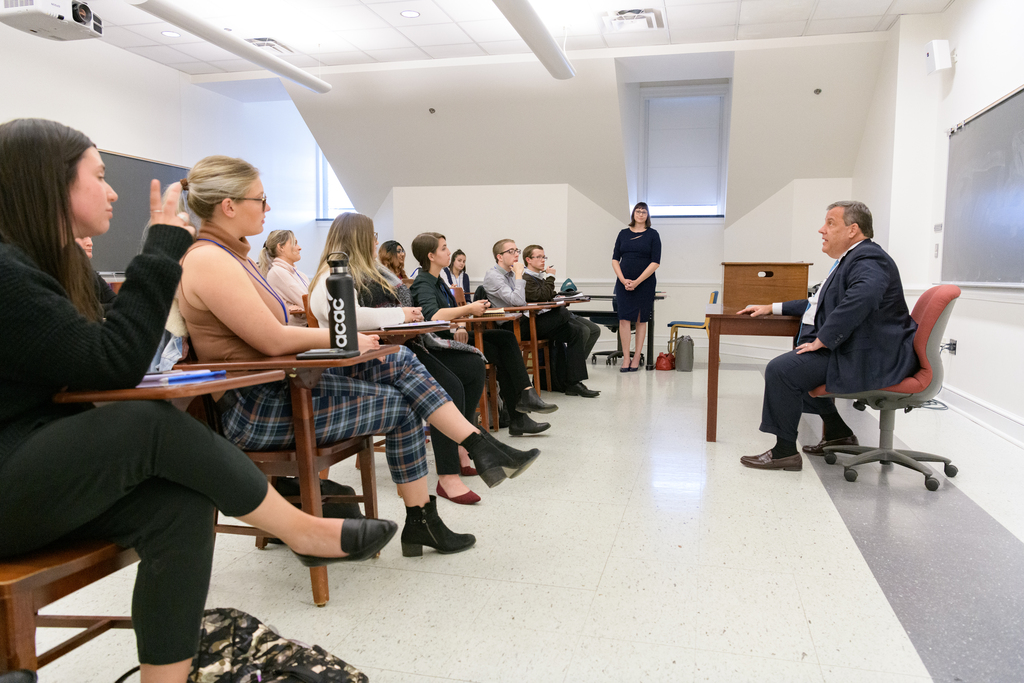leading in a crisis
Blue Hens connect with Governor Chris Christie.

By Sean O’Connor, University of Delaware junior and intern for the University of Delaware’s Center for Political Communication
Photo by Kevin Quinlan
Visit the National Agenda page to learn more about the National Agenda 2019 speaker series including “Deciphering Political Power” with Chris Christie.
APRIL 25, 2020″As of late April, roughly 278 million Americans, nearly 85 percent of the US population, live in states that have issued stay-at-home orders to advance mitigation efforts during the COVID-19 pandemic. In the course of executing these orders, state governors have become some of the most recognizable faces of leadership during the crisis. While no longer in office, former New Jersey Governor Chris Christie is doing his part to keep the spirits of Americans strong, saying “This country’s future is brighter than its current situation.”
To expand engagement during this difficult time, Lindsay Hoffman, Ph.D., director of the Center for Political Communication’s National Agenda program, began hosting weekly National Agenda “happy hour? events during the spring 2020 semester to connect National Agenda students and alumni with past speakers. Since 2011, the CPC has hosted the National Agenda program, an annual fall class and speaker series that invites nationally recognized experts in politics to address a selected theme.
Hoffman surprised the reunion attendees on April 15 with an appearance by Chris Christie, the former governor of New Jersey and a UD alumnus who graduated in 1984 with a degree in political science. Christie has spoken twice for the National Agenda series, first in 2011 and more recently in November 2019. As a two-term Republican governor in a left-leaning state, Christie is known for his bipartisan style of policy-making, and that may not have been more true than in his management of Hurricane Sandy in 2012. Christie compared Sandy with the COVID-19 crisis. “They are similar, you know, both the planning for them and the recovery from them. You need to follow certain principles of how to do these things,” Christie said. While Hurricane Sandy passed in days, COVID-19 requires simultaneous management and recovery. “You”re managing a reaction to a crisis at the same time you”re trying to manage your recovery from a crisis and that certainly increases the degree of difficulty.”
When asked whether he would do anything differently than President Donald Trump in his handling of the COVID-19 pandemic, he did not shy away. “There are a lot of things I would have done differently,” but he cited a “nature of our difference of personalities and our different experience? as the reason for those differences. While refraining from criticizing the President directly, Christie said his experience as a crisis manager, especially with Hurricane Sandy, would guide his handling of COVID-19. He also believed that the Trump administration was ‘slower in the beginning than they should”ve been? but that since mid-March President Trump has “been good? with his response.
Christie didn’t believe the mid-Atlantic region would reopen until at least mid-May. He also said that the worldwide event will change the way an “open? world operates, with things looking ‘significantly different? than before. This could include mass use of gloves and masks and the changing of seating arrangements in all public places, especially restaurants. Christie anticipated that the country will begin to fully and safely reopen with the introduction of one of three following variables: widespread testing; immunities or therapeutics that make the disease less deadly; or a vaccine.
Christie projected a voice of stern calm via his virtual connection with the National Agenda students. He spoke authoritatively, not mincing words but giving reassurance during these times of uncertainty. He reminded them of “how grateful we need to be, to be living where we”re living? during the pandemic, and of the impoverished and underprivileged circumstances of those around the world. Christie was optimistic about the future. “I think we”re going to have an even greater appreciation for this country when this is over.” Whether this newfound appreciation for life in America will sweep the country or not is unsure, but Christie was confident?”We are going to recover from this.”
